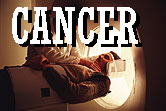- Could Your Grocery Store Meat Be Causing Recurring UTIs?
- Are You Making This Expensive Thermostat Error This Winter?
- Recognizing the Signs of Hypothyroidism
- 10 Strategies to Overcome Insomnia
- Could Artificial Sweeteners Be Aging the Brain Faster?
- Techniques for Soothing Your Nervous System
- Does the Water in Your House Smell Funny? Here’s Why
- Can a Daily Dose of Apple Cider Vinegar Actually Aid Weight Loss?
- 6 Health Beverages That Can Actually Spike Your Blood Sugar
- Treatment Options for Social Anxiety Disorder
Some Stroke Survivors May Face Heightened Cancer Risk, Study Shows


Older adults who survive a stroke may have a higher-than-average risk of developing cancer in the next few years, a new study suggests.
Researchers followed nearly 3,700 ischemic stroke survivors who were started out cancer-free. Over two years follow-up, 2 percent were newly diagnosed with cancer. The researchers determined their risk of a cancer diagnosis was 40 percent higher than the norm for older U.S. adults.
Experts said it’s not clear why the risk was elevated. That’s likely because the study wasn’t designed to discover a cause. It was only designed to look for a link between these conditions. But the association may have something to do with risk factors that underlie both stroke and certain cancers, such as smoking or unhealthy eating habits.
Another potential culprit is chronic, low-grade inflammation — which is believed to contribute to both heart trouble and cancer, said Dr. Philip Gorelick, a stroke specialist at Mercy Health and Michigan State University in Grand Rapids, who was not involved in the study.
But while the “why” is not yet certain, the findings add to evidence of a link between stroke and cancer, according to Gorelick.
“In practice, we do see people with [undiagnosed] cancer first present with a stroke,” Gorelick explained. Often, that’s related to tumors of the colon or pancreas. The cancers can cause a blood clot in the arteries supplying the brain — which then triggers an ischemic stroke, the most common form of stroke, he said.
Lead researcher Dr. Malik Adil, of the Zeenat Qureshi Stroke Institute in St. Cloud, Minn., said in fact it’s possible that some of the survivors in the current study had cancer that was present before the stroke, but not recognized.
Still, both Adil and Gorelick stressed that stroke survivors should not panic. The vast majority of study patients did not develop cancer during the two-year follow-up.
“The cancer risk was increased relative to the general population, but it was not a high risk,” Gorelick said.
Adil was scheduled to present the findings Thursday at the American Stroke Association’s annual meeting in Nashville. Studies reported at medical meetings are usually considered preliminary until the findings are published in a peer-reviewed journal.
According to Gorelick, it will be important to find out whether stroke survivors are at increased risk of particular types of cancer. That way, it might be possible to make targeted screening recommendations.
Another question that Gorelick finds “exceedingly interesting” is whether stroke survivors who use a daily low-dose aspirin have any lower risk of developing cancer. He noted that other research has suggested that aspirin can curb those odds — particularly the risk of colon cancer.
For now, Adil suggested that stroke survivors talk to their doctors about possible cancer risk factors — such as smoking, or a strong family history of a particular cancer — and find out what they can do to address them.
Gorelick agreed. “It’s too early to make any special screening recommendations, since we don’t know if stroke is associated with specific cancers,” he said.
However, he added, survivors should keep seeing their doctors, work on any modifiable cancer risk factors, and get the screenings that are already routinely recommended — such as colon cancer screening starting at age 50.
More information
The American Stroke Association has more on life after a stroke.
Source: HealthDay
Copyright © 2026 HealthDay. All rights reserved.










